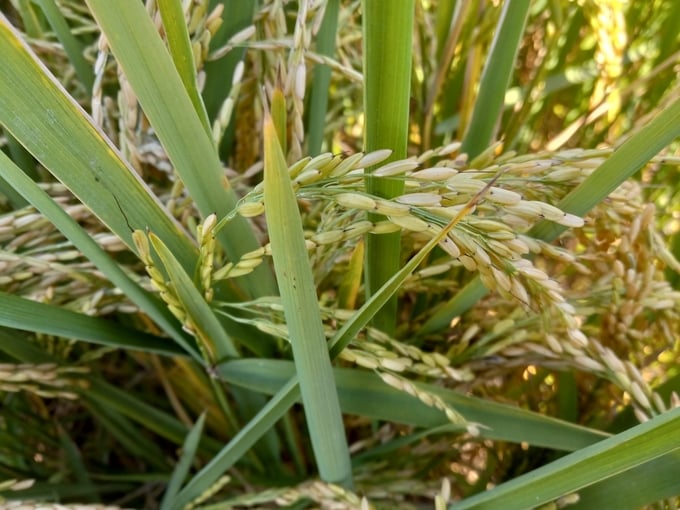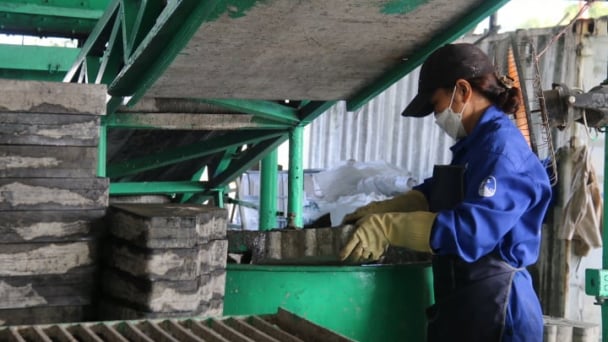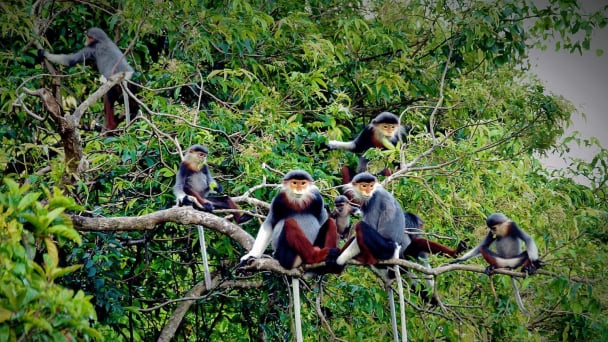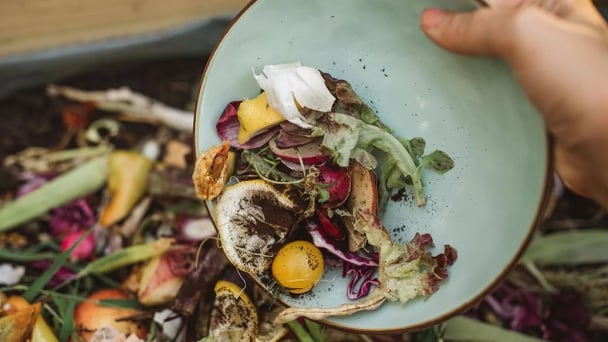May 19, 2025 | 09:52 GMT +7
May 19, 2025 | 09:52 GMT +7
Hotline: 0913.378.918
May 19, 2025 | 09:52 GMT +7
Hotline: 0913.378.918

Weedy rice is an agricultural pest that is closely related to crop rice. Here, weedy rice grows in Arkansas.
To combat this agricultural pest, rice growers in the southeastern United States have been planting rice cultivars that were tweaked to allow them to apply herbicides that target weedy rice without harming the crop.
But only a handful of years after the introduction of herbicide-resistant rice in the early 2000s, Arkansas farmers started reporting that weeds in their fields were becoming herbicide-resistant, too. Laboratory analysis verified these accounts: Scientists saw evidence that the weeds were breeding with the crop rice, and that subsequent generations of hybrid weeds had some level of genetic resistance to herbicide.
Now a new study from Washington University in St. Louis shows that more than half of the weedy rice sampled in the rice-growing region of the southeastern U.S. has become herbicide resistant. The research is published in the journal Molecular Ecology.
WashU scientists found that 57% of 201 samples of weedy rice collected from fields in nine counties or parishes of Missouri, Arkansas and Louisiana in 2022 were resistant to the imidazolinone (IMI) family of herbicides. In addition, 3.5% of samples were resistant to another newer class of herbicides that has only been used in southeastern U.S. rice fields since 2018.
Marshall Wedger, a postdoctoral fellow in biology in Arts & Sciences, has been documenting trends in weedy rice herbicide resistance for years. In previous research, Wedger found that 98% of the weedy rice he sampled in Arkansas rice fields in 2018 had genetic markers for some level of herbicide resistance.
For the new study, Wedger expanded his inquiry to include weedy rice sampled from neighboring states and also considered genetic variations within different populations of weedy rice across his study area.
"Clearfield (a trademarked commercial rice seed) has done wonders for rice farmers who were stuck with living with weedy rice. It revolutionized the industry," said Wedger, referring to the herbicide-resistant crop rice that growers started planting in the early 2000s.
"As resistance to IMI became more and more prevalent in the weeds, farmers were eager for the next herbicide resistant cultivar," he said. "Provisia and Max-Ace rice (other commercial rice seeds) are resistant to QPE, which is in an entirely different family of herbicides—meaning there would be very little cross-resistance. As such, it's another tool in a farmer's arsenal.
"It's similar to antibiotics in medicine," Wedger continued. "When resistance becomes widespread, we move on to another antibiotic. It's less that Clearfield failed and more that its lifespan ran its course."
Weedy rice is a scourge of cultivated rice production around the world. Agricultural weeds that are close relatives of crops present a challenge to farmers because of their physical similarities to the crops, which make the weeds difficult to detect and eradicate. Along the way, the imitators compete with crops for water, nutrients and space—often depressing crop yields.
Up until the early 2000s, weedy rice rarely interbred with the kinds of rice that were commonly grown in the U.S.
The widespread adoption of herbicide-resistant rice coincided with increased reliance on hybrid rice cultivars, Wedger said. Hybrid rice is higher yielding than traditional rice varieties, but it is also prone to scattering more seeds in the field.
These seeds can overwinter and reemerge in subsequent years as "volunteer rice." Volunteers flower across a wider window of time, opening up new opportunities for cross-breeding with the closely related weedy rice pest. This is one way that genes can travel from the crop to the pest.
"We find that—at least for now—individual fields have their own compositions of weedy rice in terms of strain makeup and herbicide resistance, which makes management harder," Wedger said.
Weedy rice infestations are important because they have a significant economic impact. Weedy rice causes an estimated $45 million in economic losses in the United States each year—and hundreds of millions of dollars in additional losses worldwide.
"These findings are yet another indicator of the incredible adaptability of weedy rice and other agricultural weeds—and their ability to thrive despite our best efforts to control them," said Kenneth Olsen, a George William and Irene Koechig Freiberg Professor of Biology in Arts & Sciences and senior author of the new study. "In this case, they've grabbed the best defense we've had against them—herbicide resistance—right from our own high-yielding rice cultivars."
(Phys.org)

(VAN) Deputy Minister Nguyen Quoc Tri also expressed his hope that Cuba will soon overcome its current challenges, attain food security, and further expand cooperation with Vietnam.

(VAN) The project contributes to enhancing the resilience of communities vulnerable to the impacts of climate change, with a primary focus on local women.

(VAN) Green materials help save energy and resources. However, after more than 10 years, Vietnam has only developed over 200 green buildings with more than 6 million square meters of floor space.

(VAN) Vietnam - Thailand Business Forum 2025: One plus one on three connects, marking a milestone in the comprehensive strategic partnership between the two nations.

(VAN) The United Nations designated 22 May as the International Day for Biodiversity 2025 with the theme 'Harmony with nature and sustainable development.'
![Multi-channel, multi-directional Vietnamese agricultural markets: [8] A national strategy is needed](https://t.ex-cdn.com/nongnghiepmoitruong.vn/608w/files/phucpm/2025/05/15/1435-thi-truong-nong-san-viet-da-kenh-da-huongbai-8-can-mot-chien-luoc-quoc-gia-084750_728.jpg)
(VAN) The Chairman of Hung Nhon Group shared: ‘Opening up and tapping into new markets is the right and strategic direction for Vietnam's agricultural sector.’

(VAN) Food waste has become a serious issue in modern society, especially in rapidly urbanizing and developing cities like Hanoi.